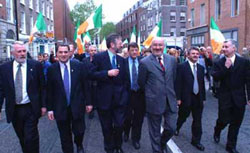 |
Irisch
Republikanische Solidarität
|
 |
REPUBLICANS LOOK FORWARD TO CHANGE
Sinn Fein mapped out a path for further all-Ireland change at its
annual conference at the weekend.
For the first time ever, the country's oldest political party
welcomed the country's national broadcaster to its Ard Fheis,
which took place at the RDS in Dublin at the weekend. Until
1992, members of Sinn Fein were banned from the airwaves under
the 'Section 31' censorship rules.
In a sense of openness and liberation, thousands of delegates
engaged in a diverse and inclusive debate on party policy, with
observers and other participants from around the world.
The motions and debates were wide-ranging. But with an election
to be held within two months in the North, and peace process
negotiations reaching a potential climax in weeks, delegates were
focussed on the tasks at hand.
Some matters were inevitably postponed. It was confirmed that any
successful outcome to the current negotiations will be followed
by an intensive debate within the party. The contentious issue
of policing reform, if finally resolved, will be decided by a
special conference of party delegates will recommend whether or
not Sinn Fein should join the North's Policing Board.
But unionism was a key focus of the main addresses by the party
leadership.
In his presidential adress on Saturday evening, Gerry Adams said
he believed that the majority of unionists want to embrace change
but "their political leaders do not want the Good Friday
Agreement to be implemented.
"That seems to be the Ulster Unionist Party's current position.
Ian Paisley has always been clear about this.
"It appears that the demands of unionism are insatiable. They are
also not deliverable."
Mr Adams said he recognised that the peace process had been
"hugely traumatic" for unionists, but he added: "In their
hearts
many unionists know that the game is up.
"It isn't over. But it is up."
He pointed out that the majority of unionists enjoyed no real
advantage under the old system of discrimination. The isolation
and social deprivation endured by working class Protestants
showed that they had been largely abandoned by the British
government. "We do not want anyone to be treated the way we
were," said the Sinn Fein President.
The peace was still "imperfect", Mr Adams admitted. "But
let's
be realistic about this. It is a lot better than what is
happening in other parts of the world at this time, and it's a
lot better than what was happening in this country over a long
time.
"Our strategy, and Mr. Trimble knows this, is about bringing an
end to physical force republicanism, by creating an alternative
way to achieve democratic and republican objectives."
But this had not been helped by the ultimatums laid down by
unionists.
"Sinn Fein is not the IRA but we have used our influence, as
every party to the Agreement is obliged to, in order to advance
the objectives of the Agreement."
An end to all of the armed groups on this island was the aim "of
every thinking republican" -- and the logic of the peace process
was moving in that direction.
"In the days and weeks ahead all of us; the British government -
the unionists - Sinn Fein - the Irish government, have decisions
to make. Those decisions could decide whether the peace process
takes a great leap forward or whether it continues at the
frustrating and begrudging pace that has marked its progress thus
far."
ELECTION TARGETED
IRA war veteran Joe Cahill, now in his eighties, also gave a
significant address the meeting, historically covered live on
Irish television.
The eight weeks between now and the elections to the Belfast
Assembly would be crucial for both Sinn Fein and Ireland, he told
the conference.
"We have won the war, now let us win the peace," he declared.
He pointed to Sinn Fein's achievements in last year's general
election in the 26 Counties, when the party quintupled its
membership of the Dublin parliament.
"We have arrived as a significant force in the political life of
this state. Irish unity is now at the centre of political life
here."
Mr Cahill said the Six County election would be unique as it gave
the current generation of republicans the chance to change
radically the political direction and make-up of the North.
He added: "For possibly the first time, we as republicans have
the future direction of politics across the island in our hands.
We cannot let that opportunity slip through our hands through
lack of work, effort or discipline."
He urged delegates to work hard over the next eight weeks to
"ensure that no stone is left unturned and that come election day
the Sinn Fein vote is larger than ever before and the opportunity
presented by our negotiation team is seized.
"Anything less would be unforgivable," he added.
POLICING DEBATE
Policing reform was clearly the most controversial issue at the
conference, and Mr Adams's confirmation that the party could
consider the issue at a special Ard Fheis was warmly applauded.
The party's policing spokesperson Gerry Kelly told delegates that
this point had not yet arrived because they had not yet achieved
the threshold for a new beginning to policing in negotiations.
"We have made progress. Be in no doubt about that. We have
brought the British government slowly but surely back towards
Patten. We have put the issue of transfer of policing and justice
at the centre of the political agenda," Mr Kelly said.
"That is, policing, under democratic control, to be shaped as a
community service and not a tool of oppression and sectarianism."
"Republicans are not against policing. In fact those who have
suffered from and continue to suffer from bad policing want
proper policing more than anyone else does.
"That includes me, it includes the parents of the Holy Cross
children, the residents of Short Strand, Whitewell, Alliance
Avenue, New Lodge, Limestone Road, sex crime victims, drugs
victims, car crime victims and all the others who want a better
way of life."
A special conference would take place after a discussion by the
party membership of any new joint document and the appointment of
delegates by local party organisations. Such a move is expected
to come too late for the Assembly elections, set for May 29.
"The unionist population may be apprehensive about the loss of
their police force," said Kelly. "But if we are honest,
republicans too are nervous about the potential of achieving a
new beginning to policing.
"The more we achieve the more nervous activists get. It is a huge
issue for us. As big an issue as the Good Friday Agreement
itself."
* Further coverage of the Ard Fheis debates is available on the web
at http://www.sinnfein.ie
Letzte Änderung:
06-Sept-03